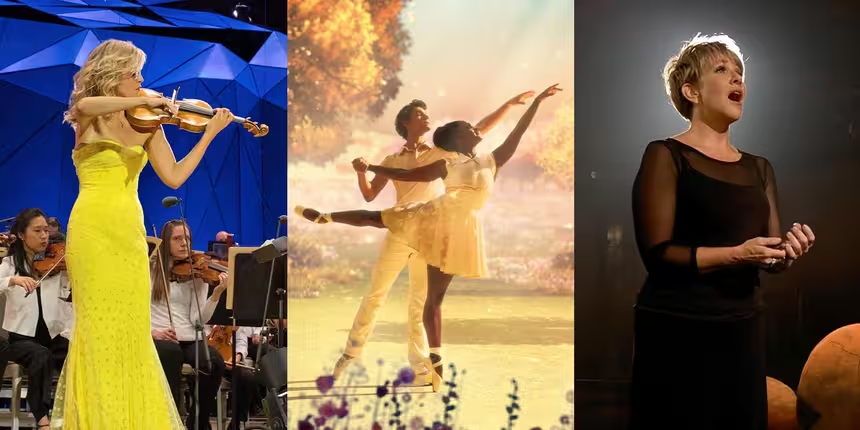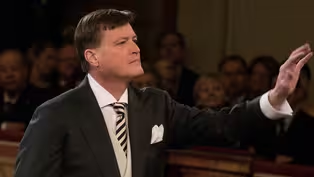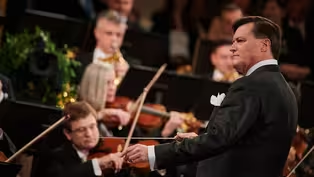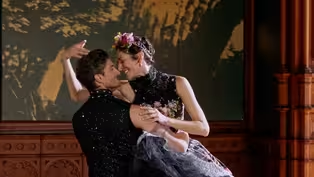
From Vienna: The New Year’s Celebration 2024
Season 51 Episode 8 | 1h 25m 10sVideo has Closed Captions
Celebrate the New Year with waltzes by Strauss and more.
Celebrate the New Year with waltzes by Strauss and more performed by the Vienna Philharmonic Orchestra led by guest conductor Christian Thielemann. PBS favorite Hugh Bonneville returns to host.
Problems playing video? | Closed Captioning Feedback
Problems playing video? | Closed Captioning Feedback
Major series funding for GREAT PERFORMANCES is provided by The Joseph & Robert Cornell Memorial Foundation, the Anna-Maria and Stephen Kellen Arts Fund, the LuEsther T. Mertz Charitable Trust, Sue...

From Vienna: The New Year’s Celebration 2024
Season 51 Episode 8 | 1h 25m 10sVideo has Closed Captions
Celebrate the New Year with waltzes by Strauss and more performed by the Vienna Philharmonic Orchestra led by guest conductor Christian Thielemann. PBS favorite Hugh Bonneville returns to host.
Problems playing video? | Closed Captioning Feedback
How to Watch Great Performances
Great Performances is available to stream on pbs.org and the free PBS App, available on iPhone, Apple TV, Android TV, Android smartphones, Amazon Fire TV, Amazon Fire Tablet, Roku, Samsung Smart TV, and Vizio.
Buy Now

Great Performances Newsletter
Subscribe to the Great Performances newsletter to keep up with the latest full episodes to stream, exclusive content, and more!Providing Support for PBS.org
Learn Moreabout PBS online sponsorship♪♪ -Hello, everyone!
I'm Hugh Bonneville, wishing you a happy New Year from the Austrian Alps.
[ Johann Strauss's "The Blue Danube" plays ] In Vienna today, the Golden Hall is filled with the music of "The Waltz King," Johann Strauss.
Christian Thielemann leads the Vienna Philharmonic in the Musikverein, and we'll visit romantic castles and Alpine villages with the Vienna State Ballet.
So, join us, from Vienna.
"The New Year's Celebration 2024" is next on "Great Performances."
♪♪ [ Instruments tuning ] -Happy New Year.
I'm Hugh Bonneville, delighted to be back in this magnificent hall for this festive holiday concert.
200 years ago, two young composers and band leaders, Josef Lanner and Johann Strauss, were causing a sensation here in Vienna with a new dance called the waltz.
Starting with the common folk, in no time, it caught on with the upper crust.
By the time Johann's three sons, Johann, Josef, and Eduard, got into the family business of composing, the waltz had spread worldwide.
With this, our 40th New Year's concert on PBS today, I think we can attest to its continuing popularity.
Here in the Musikverein, we and the Vienna Philharmonic are awaiting the entrance of Christian Thielemann.
Today marks his second appearance at this iconic New Year event.
For 12 years, the busy maestro has been principal conductor of the Staatskapelle Dresden, but next fall, he'll succeed Daniel Barenboim as general music director of the Staatsoper Unter den Linden in Berlin.
Now, let's begin with some sparkling waltz melodies from Johann Jr.'s "Waldmeister" operetta.
The Waltz King premiered the piece right here, in this very hall.
♪♪ ♪♪ ♪♪ ♪♪ ♪♪ ♪♪ ♪♪ ♪♪ ♪♪ ♪♪ ♪♪ ♪♪ ♪♪ ♪♪ ♪♪ ♪♪ ♪♪ ♪♪ ♪♪ ♪♪ ♪♪ ♪♪ ♪♪ ♪♪ ♪♪ ♪♪ ♪♪ ♪♪ ♪♪ ♪♪ ♪♪ ♪♪ ♪♪ ♪♪ ♪♪ ♪♪ ♪♪ [ Music stops ] [ Applause ] ♪♪ ♪♪ ♪♪ ♪♪ ♪♪ ♪♪ ♪♪ ♪♪ ♪♪ ♪♪ ♪♪ ♪♪ ♪♪ ♪♪ ♪♪ ♪♪ ♪♪ ♪♪ ♪♪ ♪♪ ♪♪ ♪♪ [ Song ends ] [ Cheers and applause ] The little spa town of Bad Ischl, high in the Alps, was the summer capital of the Austro-Hungarian monarchy from the middle of the 19th century until its fall in 1918.
And this was its center, the Kaiservilla, a wedding present from the Emperor Franz Joseph's mother upon his marriage to his teenage first cousin Elisabeth.
Sisi, as she was known to the family, was renowned as one of the great beauties of the 19th century.
While the young groom had been educated to be emperor of Austria from birth, his young and spirited bride had not, growing up in the countryside.
A tomboy by nature, this strong swimmer and expert rider felt caged by the rigid demands of the imperial court and could never reconcile herself to the formality of life in Vienna.
It was only in the summers, in Ischl, that she felt truly free and happy.
Sadly, early on in their marriage, the young lovers were beset by tragedy.
They lost their first child at the age of 2.
The Emperor's brother, Maximilian, was executed in Mexico in 1867, and in 1886, her beloved cousin, the "Mad King Ludwig" of Bavaria, drowned.
Finally, in 1889, their only son and heir murdered his mistress and then shot himself.
From here on, Elisabeth dressed in black and yearned for death.
Until the end of her life, Elisabeth looked back on her youth, on the freedom and closeness to nature she had enjoyed in her childhood, as a paradise lost.
Only here, at the Kaiservilla, and in the hideaway the young emperor built for her just up the hill, did she feel at home.
Elisabeth called this her Magic Mountain, and she never lost her fascination for it, a place her husband called his "Heaven on Earth."
♪♪ ♪♪ ♪♪ ♪♪ ♪♪ ♪♪ ♪♪ ♪♪ ♪♪ ♪♪ ♪♪ ♪♪ ♪♪ ♪♪ ♪♪ ♪♪ ♪♪ ♪♪ ♪♪ ♪♪ ♪♪ ♪♪ ♪♪ ♪♪ ♪♪ ♪♪ ♪♪ ♪♪ ♪♪ ♪♪ ♪♪ ♪♪ ♪♪ ♪♪ ♪♪ ♪♪ ♪♪ ♪♪ ♪♪ ♪♪ ♪♪ ♪♪ ♪♪ [ Song ends ] It's in Bad Ischl that the love story of the young emperor and Sisi began.
Franz Joseph had succeeded to the imperial throne of Austria at the age of 18, after his childless uncle, Ferdinand, abdicated in the wake of the revolutions in 1848.
After five years, the future of the dynasty demanded he acquire a wife.
Immediately, his domineering mother, once described as "the only real man in the Hofburg Palace," sprang into action, planning -- what else?
-- a ball for her son's birthday.
She wrote to her sister in Bavaria, inviting her 18-year-old niece, Helene, to the celebrations.
The 15-year-old Elisabeth tagged along.
For the Emperor, it was love at first sight, but not for cousin Helene.
He wrote in his diary, "Oh, but how sweet Sisi is.
She's as fresh as a budding almond.
And what a magnificent crown of hair frames her face.
What lovely soft eyes she has, and lips like strawberries."
At the ball, he led the dancing with Elisabeth as his partner, and the next day, his 23rd birthday, she sat beside him at the family lunch.
Afterwards, he told his mother that he would marry Elisabeth or no one.
He proposed, and, in a perfect Cinderella moment of romantic euphoria and emotional confusion, the innocent young girl said, "Yes."
The emperor would regard this villa as a private retreat for his bride and their family, somewhere they could relax, hunting and hiking in the woodlands and hillsides.
From 1855, the young Johann Strauss could be found leading his orchestra in the Ischl Park Pavilion.
In our next polka, he mimics the song of the bird he heard chirping away on those summer evenings, the nightingale.
♪♪ ♪♪ ♪♪ ♪♪ ♪♪ ♪♪ ♪♪ ♪♪ ♪♪ ♪♪ ♪♪ ♪♪ ♪♪ ♪♪ ♪♪ ♪♪ ♪♪ ♪♪ ♪♪ ♪♪ ♪♪ ♪♪ ♪♪ ♪♪ [ Song ends ] [ Applause ] Bad Ischl is just one of the salt-mining communities of the Salzkammergut, the salt crown estate.
For over 600 years, right up until the 20th century, the Habsburg salt monopoly was a mainstay of the ruling family's finances.
Around 200 years ago, a new use for Ischl's underground wealth was discovered.
The therapeutic qualities of its mineral springs transformed the sleepy little community on the Traun and Ischl Rivers into a meeting place for European high society.
They flocked to the Trinkhaus to drink and bathe in the salty waters.
They dined and danced in the Kurhaus, where innumerable imperial balls, receptions, and dinners honored visiting heads of state, and strolled along the riverbank in the latest fashions.
Back in the capital, safe drinking water was becoming a concern for the city's ever-increasing population.
To satisfy demand, the Emperor donated springs on another of his estates to bring pure water 60 miles, by gravity, from high in the Alps all the way to Vienna's taps.
150 years ago, the Viennese cheered when the Emperor turned on the high-jet fountain, inaugurating the First Vienna Mountain Spring Water Pipeline.
"Handsome" Eddie Strauss celebrated the occasion with his "Mountain Spring Polka."
♪♪ ♪♪ ♪♪ ♪♪ ♪♪ ♪♪ ♪♪ ♪♪ ♪♪ ♪♪ ♪♪ ♪♪ ♪♪ ♪♪ ♪♪ ♪♪ ♪♪ ♪♪ ♪♪ ♪♪ ♪♪ ♪♪ ♪♪ ♪♪ ♪♪ ♪♪ [ Song ends ] [ Applause ] Mmm.
That's too good.
In summer, the intellectual and cultural life of Vienna migrated, en masse, to the salons and cafés of Ischl.
Theater season ran from mid June through mid September, and when in production, the writers, singers, and composers would all escape across from the stage door to the Café Ramsauer.
Johann Strauss, Franz Lehár, Johannes Brahms, and Anton Bruckner were patrons, Brahms and Strauss often together at the billiard table.
By the 1890s, Strauss was busy composing operettas and conducting only on special occasions.
For instance, for the King of Siam, the Emperor arranged for the composer himself to conduct a gala performance of "Die Fledermaus" in the Ischl theater.
Franz Joseph's journals record that, one summer, he attended the theater nine times, usually accompanied by his daughter, one night writing, "I slept well and long in the Court box."
Let's hope Johann Strauss's "New Pizzicato Polka" doesn't awaken His Majesty.
♪♪ ♪♪ ♪♪ ♪♪ ♪♪ ♪♪ ♪♪ ♪♪ ♪♪ ♪♪ ♪♪ ♪♪ ♪♪ ♪♪ ♪♪ ♪♪ ♪♪ ♪♪ ♪♪ ♪♪ [ Song ends ] [ Cheers and applause ] Vienna's monumental neogothic-style city hall, the Rathaus, officially opened with a ball here in the Festsaal during the carnival season of 1890.
Two orchestras were engaged for the evening and played in tandem from opposite ends of the hall.
At this end was the Strauss orchestra, under the direction of Eduard Strauss.
Commissioned for the occasion was his brother Johann's new "City Hall Ball Dance."
It began with a musical quote from his "Blue Danube" waltz, even then, a famous symbol of imperial Vienna.
This gave way to a mishmash of tunes, ending with a snippet from Haydn's "God Save Our Emperor."
The size of this enormous room is nearly that of an American football field and is dotted with statues of the city's mayors over the centuries.
Way down at the other end, Vienna's own Hoch- und Deutschmeister, or High and German Master Military Band, conducted by its kapellmeister Carl Ziehrer, was ready to play the second piece commissioned for the ball.
Of the two waltzes that night, one from each end of the hall, it is Ziehrer's terrific dance piece, a tribute to the citizens of Vienna, that stole the show and remains the more popular to this day.
♪♪ ♪♪ ♪♪ ♪♪ ♪♪ ♪♪ ♪♪ ♪♪ ♪♪ ♪♪ ♪♪ ♪♪ ♪♪ ♪♪ ♪♪ ♪♪ ♪♪ ♪♪ ♪♪ ♪♪ ♪♪ ♪♪ ♪♪ ♪♪ ♪♪ ♪♪ ♪♪ ♪♪ ♪♪ ♪♪ ♪♪ ♪♪ ♪♪ ♪♪ ♪♪ ♪♪ ♪♪ ♪♪ [ Song ends ] The eagle, the lord of the air, is at the center of the Habsburg dynasty's coat of arms.
Every August, their banners lined the streets for the celebrations on the Emperor's birthday.
Franz Joseph's parents had come originally to Ischl and its saline baths looking to become pregnant.
Apparently, it worked, because after treatments here, his mother bore three sons in succession.
Thereafter, they were known as the Salt Princes.
The summer after his birth, the baby Franz Joseph was brought to Ischl to celebrate his 1st birthday, a tradition he followed for the next 80 years.
Central to the festivities would be the mass in the little parish church of St. Nikolaus, with Franz Joseph in attendance.
On the morning of August the 19th, 1853, the Emperor and his parents went on foot, as usual, to his birthday mass.
On reaching the church, the public knew something was up when Franz Joseph's mother, the archduchess, stepped aside and motioned to Elisabeth to enter the church ahead of her.
With this gesture, it was clear that the young girl was to be the new empress of Austria.
At the end of the service, as the congregation sang the imperial anthem, Franz Joseph took Sisi by the hand, led her to the priest, and said, "Give us your blessing, Father.
This is my bride."
Special occasions here often featured the great composer Anton Bruckner in performance.
He was the organist at the wedding of the Emperor's youngest daughter.
Her descendants are still in residence at the Kaiservilla today.
Now, to launch his 200th birthday year, the Philharmonic pays tribute to Bruckner with this charming quadrille.
♪♪ ♪♪ ♪♪ ♪♪ ♪♪ ♪♪ ♪♪ ♪♪ ♪♪ ♪♪ ♪♪ ♪♪ ♪♪ ♪♪ ♪♪ ♪♪ ♪♪ ♪♪ ♪♪ ♪♪ ♪♪ ♪♪ ♪♪ ♪♪ ♪♪ ♪♪ ♪♪ ♪♪ ♪♪ ♪♪ ♪♪ ♪♪ ♪♪ [ Song ends ] [ Applause ] This is the Hofburg castle, the heart of the Habsburg's realm.
Encapsulated within it is the gothic Augustinian church of 1327.
When in Vienna, Anton Bruckner often gave organ recitals here.
And it was in this church that the wedding of the century took place just eight months after the engagement of Franz Joseph and Elisabeth in Ischl.
At 7:00 on an April evening, in imperial splendor, under 15,000 candles, the archbishop of Vienna, attended by 70 bishops and priests, married the 23-year-old Emperor and his 16-year-old bride.
This was a sacred affair and, as such, was attended only by the court.
No prying eyes of the media in those days.
So, the public had no idea of what the bride wore.
For a century and a half, her descendants kept her magnificent train, but it wasn't until 2021 that a contemporary portrait of the Empress wearing the entire ensemble was discovered.
A reconstruction of the gown now appears in Vienna for all to see.
A grand banquet followed in the Hofburg, with the 28-year-old Johann Strauss directing the dancing in the palace ballrooms.
Now, how about a spirited gallop to wish us all a happy New Year.
It's by a Danish composer, nicknamed "The Strauss of the North."
♪♪ ♪♪ ♪♪ ♪♪ ♪♪ ♪♪ ♪♪ ♪♪ ♪♪ ♪♪ ♪♪ [ Song ends ] [ Applause ] Imagine the nervous anticipation a patient must have felt climbing the stairs at Berggasse 19.
You'd open the door to the cloak room, hang up your coat, and enter the waiting room of Dr. Sigmund Freud.
Here, the patient waited anxiously for his or her therapy.
On Wednesday evenings, Freud's early followers, physicians, writers, and intellectuals, gathered for their weekly Psychological Society meetings, a forerunner of the psychoanalytic organizations which today stretch around the world.
In these rooms, he developed a science that fundamentally changed our understanding of the human psyche, and 125 years ago, he wrote what he considered his most important work, "The Interpretation of Dreams."
On the walls are certificates and awards, pictures of colleagues and friends, like this one of Albert Einstein, and a rather appropriate engraving, "The Nightmare."
Like the father of dreams, Josef Strauss explored altered states of consciousness in his "Deliriums" waltz, written for the ball of the medical students at the University of Vienna.
The introduction portrays acute delirium, but with the first waltz, the hysteria abates and sanity is restored.
♪♪ ♪♪ ♪♪ ♪♪ ♪♪ ♪♪ ♪♪ ♪♪ ♪♪ ♪♪ ♪♪ ♪♪ ♪♪ ♪♪ ♪♪ ♪♪ ♪♪ ♪♪ ♪♪ ♪♪ ♪♪ ♪♪ ♪♪ ♪♪ ♪♪ ♪♪ ♪♪ ♪♪ ♪♪ ♪♪ ♪♪ ♪♪ ♪♪ ♪♪ ♪♪ ♪♪ ♪♪ ♪♪ ♪♪ ♪♪ ♪♪ ♪♪ ♪♪ ♪♪ ♪♪ ♪♪ ♪♪ ♪♪ ♪♪ ♪♪ ♪♪ ♪♪ ♪♪ [ Song ends ] [ Cheers and applause ] What's my diagnosis of Josef's "Deliriums" waltz?
I think the orchestra was prescribed the perfect piece to wrap up today's program.
But the festivities are far from over.
Tradition demands three encores from our illustrious players.
The first is a flashy little ditty that Josef, an enthusiastic fan of the racetrack, called "Jockey Polka."
[ Cheers and applause ] ♪♪ ♪♪ ♪♪ ♪♪ ♪♪ ♪♪ ♪♪ ♪♪ ♪♪ [ Song ends ] [ Pop! ]
[ Cheers and applause ] By the end of the 19th century, many of the luminous figures of music were gone, buried in Vienna's central cemetery.
Brahms's grave lies next to that of his friend Johann Strauss.
The Empress Elisabeth spent the first two weeks of July 1898 at the Kaiservilla.
Before leaving to visit her family in Bavaria, she and her husband took one last stroll around the park.
Two months later, she was stabbed to death in Geneva.
"You have no idea how much I loved this woman," the Emperor cried when told of her murder.
Their life together had ended where it had begun, here in Ischl.
In the summer of 1914, this study in the Kaiservilla became the center of world attention after the murder of the Archduke in Sarajevo.
At this desk, Franz Joseph signed Austria-Hungary's ultimatum to Serbia.
Tensions escalated rapidly as other powers intervened, and on July the 28th, he signed the manifesto "An Meine Volker," explaining to the people of empire why he had been forced to declare war.
That year, there would be no birthday celebration.
Franz Joseph left for Vienna, never to see his beloved Ischl again.
The Waltz King, Johann Strauss, died 125 years ago.
At a celebration marking the 50th anniversary of his debut, he named the inspiration of his art "My beloved city Vienna, in whose soil is rooted my whole strength, in whose air floated the melodies my heart drank in and my hand wrote down."
Of those melodies, none is more beloved than his "Blue Danube" waltz.
[ Applause ] -[ Speaking German ] [ Cheers and applause ] ♪♪ ♪♪ ♪♪ ♪♪ ♪♪ ♪♪ ♪♪ ♪♪ ♪♪ ♪♪ ♪♪ ♪♪ ♪♪ ♪♪ ♪♪ ♪♪ ♪♪ ♪♪ ♪♪ ♪♪ ♪♪ ♪♪ ♪♪ ♪♪ ♪♪ ♪♪ ♪♪ ♪♪ ♪♪ ♪♪ ♪♪ ♪♪ ♪♪ ♪♪ ♪♪ ♪♪ ♪♪ ♪♪ ♪♪ ♪♪ ♪♪ ♪♪ ♪♪ ♪♪ ♪♪ ♪♪ ♪♪ ♪♪ ♪♪ ♪♪ ♪♪ ♪♪ ♪♪ ♪♪ ♪♪ ♪♪ ♪♪ [ Song ends ] [ Cheers and applause ] -Christian Thielemann and the Vienna Philharmonic have sent their New Year's greetings of hope, friendship, and peace to the world with the "Blue Danube" waltz.
So now it's time for the maestro to signal to the drummer to launch the new year, and it's time for us to clap to the beat of "The Radetzky March."
In Vienna, I'm Hugh Bonneville, wishing you and yours a joyous and healthy 2024.
[ Applause continues ] [ Drumming ] ♪♪ ♪♪ [ Audience clapping ] ♪♪ ♪♪ [ Clapping stops ] ♪♪ ♪♪ ♪♪ [ Audience clapping ] ♪♪ ♪♪ [ Clapping stops ] ♪♪ ♪♪ [ Audience clapping ] ♪♪ [ Clapping stops ] ♪♪ [ Audience clapping ] ♪♪ [ Clapping stops ] ♪♪ [ Audience clapping ] ♪♪ [ Clapping stops ] ♪♪ ♪♪ [ Audience clapping ] ♪♪ ♪♪ -To find out more about this and other "Great Performances" programs, visit pbs.org/greatperformances, find us Facebook, and follow us on X.
♪♪ To order the New Year's Concert 2024 on DVD or Blu-ray or the CD, visit shopPBS.org, or call 1-800-PLAY-PBS.
♪♪ [ Cheers and applause ] [ Applause continues ] ♪♪
Video has Closed Captions
Clip: S51 Ep8 | 3m 15s | The Vienna Philharmonic Orchestra performs Strauss' "The Beautiful Blue Danube." (3m 15s)
From Vienna: The New Year’s Celebration 2024 Preview
Video has Closed Captions
Preview: S51 Ep8 | 30s | Celebrate the New Year with waltzes by Strauss and more. (30s)
The Vienna State Ballet Performs Strauss' "Ischl Waltz"
Video has Closed Captions
Clip: S51 Ep8 | 1m 57s | Viennese dancers perform to Johan Strauss II's "Ischl Waltz." (1m 57s)
Providing Support for PBS.org
Learn Moreabout PBS online sponsorship

- Arts and Music
The Best of the Joy of Painting with Bob Ross
A pop icon, Bob Ross offers soothing words of wisdom as he paints captivating landscapes.












Support for PBS provided by:
Major series funding for GREAT PERFORMANCES is provided by The Joseph & Robert Cornell Memorial Foundation, the Anna-Maria and Stephen Kellen Arts Fund, the LuEsther T. Mertz Charitable Trust, Sue...



